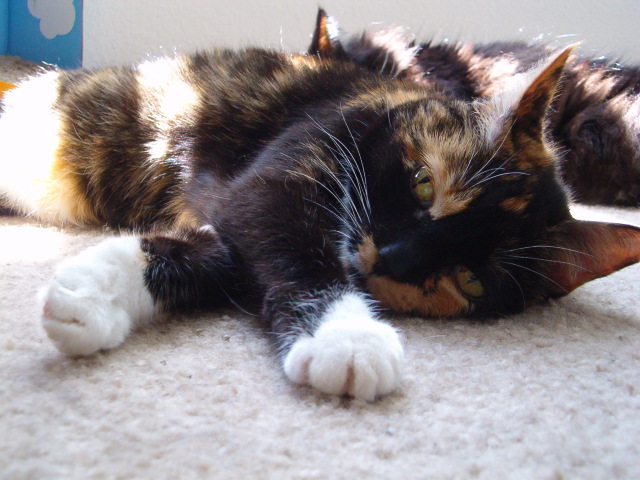
One of the hardest things I’ve ever had to do is euthanize my 14-year-old tortoiseshell cat, Zoe. My petite little Zoe had been with me for some of the most trying years of my life: undergraduate and grad school, moving across country, several boyfriends of whom she was (rightfully) suspicious. We were best buds and had seen a lot together. Then, one day I noticed that she looked thinner than I remembered her being. It’s strange – you see someone every day, and then all of a sudden something is different. And you realize that it must be a pretty dramatic change for you to actually see it. And then the fear comes.
I told myself I was just over-reacting and that she’d always been a small kitty – she was just losing weight because she was getting older. I pretended the change was normal. But inside I knew something was wrong, and this was confirmed when I took her to my vet and, after many extensive (and expensive) tests, the results were revealed: small cell lymphoma.
At the time, most cats with the disease survived just under a year from the time of diagnosis. I had Zoe for about 18 months after I received the bad news, during which time we saw feline cancer specialists, had a couple of overnight medical emergencies, struggled with daily medications (which resulted in Zoe developing diabetes from the steroids she was on), gave subcutaneous fluids at home, and even regularly received acupuncture (Zoe, not me). I have to say, Zoe was a trooper until one morning when she told me, with a very distinctive meow that I had never heard before, that it was time to let her go.
That was my first experience with pet cancer, but it was not the last, and there will likely be more to come. I don’t know if I would’ve changed the outcome for Zoe if I had detected her health problems sooner, but for some types of cancers, early detection can be critical in either stopping its spread, getting cancer to go into remission, or simply buying more time with your furry loved one. Cats are very good at hiding pain, so the symptoms of cancer aren’t always obvious. However, there are some signs to look out for, as reported by petplace.com:
- A lump or mass that grows in size
- A sore that doesn’t heal
- Changes in urination and/or defecation habits
- Difficulty urinating or defecating
- Unexplained bleeding or discharge from any orifice
- Loss of appetite, or difficulty in eating or swallowing
- Weight loss
- Difficulty breathing
- Lameness or stiffness
- Foul odor
May is Pet Cancer Awareness Month (which also happens in November). If you recognize any of the above symptoms in your pet, please see your veterinarian to get checked out. Today, there are many ways to treat cancer successfully: surgery, chemotherapy, radiation, and medications. An early diagnosis will give your kitty the best chance for a positive outcome, so any questions you have about the health of your cat should be brought to your vet’s attention immediately.
I’m sure that cancer has touched your life in some way in the past. For me, I’m committed to making sure that I make the best and most humane decisions for my kitties as possible, no matter what challenges life will bring to them. And the earlier we identify those challenges, the more options we’ll have. Let’s not give cancer the opportunity to make those decisions for us or our pets.

